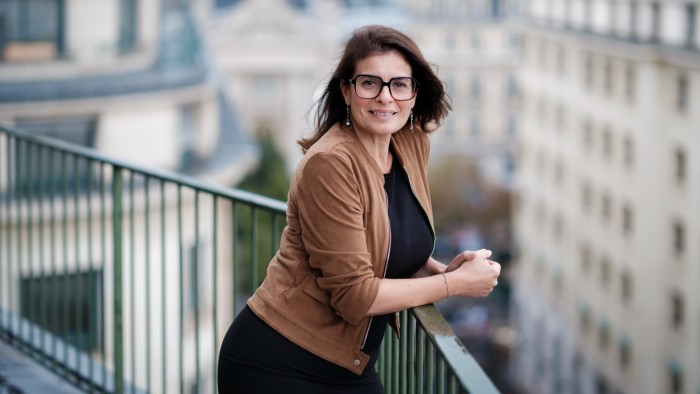Learning to do business in an uncertain world

Roula Khalaf, Editor of the FT, selects her favourite stories in this weekly newsletter.
When human resources director Carole Bereby enrolled in the executive MBA at HEC Paris two years ago, the geopolitics of coronavirus were straining the global supply chain of her company: the French lingerie brand Aubade. Border closures caused delays for materials coming from Europe to the company’s production site in Tunisia.
Bereby and her executive committee were forced to react swiftly by finding alternative suppliers that were less affected by Covid, and by protecting the welfare of workers on the factory floor. Even as pandemic restrictions have eased, Bereby remains conscious that her company operates in an era of heightened geopolitical volatility.
But she now feels more confident in navigating this environment following her EMBA, which included sessions on geopolitics. In these, Bereby learnt how to assess and anticipate political risks and plan for contingencies.
“The programme allowed me to understand that companies must reconcile their commercial objectives with the changing environment around them,” she says. “When you’re in a business and you want to make it grow, you have to translate the analysis of the global environment into a commercial strategy.”
It is not a subject that has traditionally been taught in business schools, says Cédomir Nestorovic, a professor of geopolitics and Islamic business at Essec Business School in France. But that is starting to change as schools respond to rising international tensions by giving the issues greater prominence in the curriculum. Nestorovic teaches a mandatory course focusing on the geopolitics of Asia in the Essec & Mannheim joint EMBA at the Essec Singapore campus. He says that growing friction between and within states has underlined the need for executives to learn how to navigate an increasingly uncertain global environment.
“With the three-decade march of globalisation, companies were used to some degree of certainty,” Nestorovic says. But successive geopolitical shocks, from Russia’s war in Ukraine to US-China decoupling and disruptions to trade caused by coronavirus, have challenged globalisation and stoked ambiguity. As a consequence, he says teaching geopolitics is becoming a wider trend in EMBA programmes.
Mike Rosenberg, professor of the practice of management at Iese Business School in Barcelona, agrees. “Geopolitics is becoming a hotter topic,” he says. Although many companies now operate globally, Rosenberg says executives often have no training in geopolitical analysis and have been caught flat-footed by global shocks.
“The business world does not pay enough attention to geopolitical issues,” he says. “For those in a serious position of responsibility, that’s just not good enough.”
Rosenberg believes that executives must consider political and social issues outside their core areas of business. “The best international business leaders have that intellectual curiosity,” he says.
To help them make better decisions when faced with political change and ambiguity, he delivers a course in Iese’s Global EMBA that gives participants exposure to geopolitical analysis and practical experience in applying the discipline in different parts of the world.
Increasingly, executives also need an appreciation for how geopolitics can make or break the fortunes of a company, says Angel Saz-Carranza, director of the Center for Global Economy and Geopolitics at Spain’s Esade Business School. “Practically not a day goes by without an example in the news of how geopolitics affects the bottom line and strategies of global firms,” he says.
Saz-Carranza cites as one example the decision by UK-listed oil group BP to divest its stake in Russia’s state oil company, Rosneft, following Moscow’s invasion of Ukraine, which could result in $25bn of charges.
To help students navigate an increasingly politicised business environment, he delivers two courses on geopolitics in Esade’s EMBA. The associate professor admits, however, that the subject can be hard to teach. Given the international diversity in EMBA cohorts, it can ignite tensions between participants who come from varied backgrounds and cultures.
“You’re dealing with people’s identities and ideologies, which is delicate,” says Saz-Carranza. “I try to avoid saying what is wrong and right, allowing for the nuances and different positions to show up in discussions, and making sure things do not turn personal. But sometimes people have trouble letting go of their patriotism.”
Another challenge is academics having to constantly refresh the curriculum. “The challenge with geopolitics is that it’s a global topic that’s always evolving, so you need to constantly update your expertise,” says Robert Falkner, professor of international relations at the London School of Economics, which delivers the Trium Global EMBA jointly with HEC Paris and NYU Stern School of Business in New York.
Falkner says multidisciplinary expertise is required to teach geopolitics, but is often missing. “One of the shortcomings is the lack of depth of expertise in business schools, which may need to think more about their links to other academic departments.”
David Elmes, a professor of practice at the UK’s Warwick Business School, agrees. “Business schools are realising the world is more fragmented. It’s not a single global economy, and globalisation is unravelling. But not many business schools know how to tackle that, because it’s not about just adding to previous models — it’s seeing things from a different perspective.”
Beyond providing students with an understanding of how politics shapes business, schools also need to be teaching about the forces that are changing politics itself, according to Jeremy Ghez, associate professor of economics and international affairs at HEC.
“We need a broader conversation about inequality, the environment and technology to really understand the business environment,” he says, calling for a new methodology. “The major feature of this methodology is that you never make a business decision in a vacuum.”
Comments